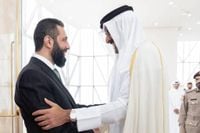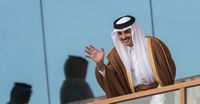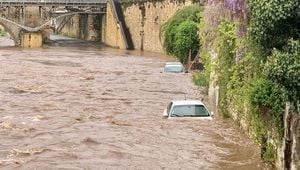On April 17, 2025, Qatar's Permanent Representative to the United Nations, Sheikha Alya Ahmed bin Saif Al-Thani, held a significant meeting with Huang Xia, the Special Envoy of the UN Secretary-General for the Great Lakes Region, at the UN Headquarters in New York. This encounter comes at a time when Qatar continues to play a pivotal role in international diplomacy, particularly in regions marked by conflict and instability.
During their discussion, Huang Xia expressed his appreciation for the active role Qatar has been playing in supporting UN initiatives aimed at promoting peace and stability in the Great Lakes region. This acknowledgment underscores Qatar's commitment to fostering diplomatic efforts that seek to address the underlying issues affecting this volatile area.
In response, Sheikha Alya reaffirmed Qatar's dedication to supporting UN efforts geared towards achieving peace and promoting sustainable development in the region. "Qatar is committed to being a reliable partner in peace initiatives, striving for a harmonious future for all nations involved," she stated, highlighting the country's ongoing diplomatic efforts.
Meanwhile, on the same day, a commentary piece titled "Catering to Qatar" sparked discussions about the nation's role in international affairs. The article raised questions about why Qatar, often criticized for its past actions, continues to receive support from major world leaders. It referenced a March 7 interview with Qatar’s Prime Minister, Mohammed bin Abdulrahman Al Thani, conducted by podcaster Tucker Carlson, which some commentators described as a whitewashing of the regime's past transgressions.
Despite the criticisms, the commentary noted that Secretary of State Marco Rubio praised Qatar for its role in facilitating the release of Delta Airlines mechanic George Glezmann, who had been held hostage by the Taliban for two and a half years. In a statement, Rubio expressed gratitude for Qatar's "steadfast commitment and diplomatic efforts," which were crucial in securing Glezmann's release. This incident highlights Qatar's complex positioning as a mediator in international conflicts, showcasing its ability to navigate delicate negotiations.
Further emphasizing Qatar's diplomatic efforts, Steve Witkoff, who served as Trump's Middle East envoy, remarked on the motivations behind Qatar's actions. He stated, "It’s preposterous to think that the Qataris are not well motivated. They are good, decent people who seek effective mediation that leads to peace. Being a small nation, they want acknowledgment as peacemakers." This perspective sheds light on the nuanced intentions behind Qatar's foreign policy, often overshadowed by its controversial reputation.
In another significant development earlier this week, Syrian President Ahmad al-Sharaa met with Iraqi Prime Minister Mohammed Shia Al-Sudani in Qatar, facilitated by Emir Tamim bin Hamad Al Thani. This tripartite meeting, which included Lebanese President Joseph Aoun, focused on the ongoing volatile situation in Syria.
The Iraqi Prime Minister emphasized Iraq’s close monitoring of developments in Syria, particularly concerning the presence of Israeli occupation forces. He reiterated Iraq’s unwavering stance advocating for a comprehensive political process that respects Syria’s diverse social, religious, and national components. Al-Sudani also called for the protection of sacred sites and the rights of all Syrian communities, highlighting recent incidents involving Syria’s Alawite community.
This meeting, which took place around April 15 or 16, 2025, signifies the importance of regional cooperation in addressing the challenges facing Syria and the broader region. The discussions reflect a collective effort among neighboring countries to navigate the complexities of the ongoing conflict and work towards a peaceful resolution.
As these events unfold, Qatar's role in international diplomacy continues to be a focal point of discussion. While the nation faces scrutiny over its past actions and affiliations, its involvement in peace initiatives and humanitarian efforts cannot be overlooked. The recent meetings and statements from leaders highlight a commitment to fostering dialogue and collaboration in pursuit of stability in the Great Lakes region and beyond.
In conclusion, Qatar stands at a crossroads, balancing its controversial past with a future that aims to position it as a key player in global peace efforts. As international dynamics evolve, the nation's diplomatic engagements will be crucial in shaping its reputation and effectiveness as a mediator in conflicts.





